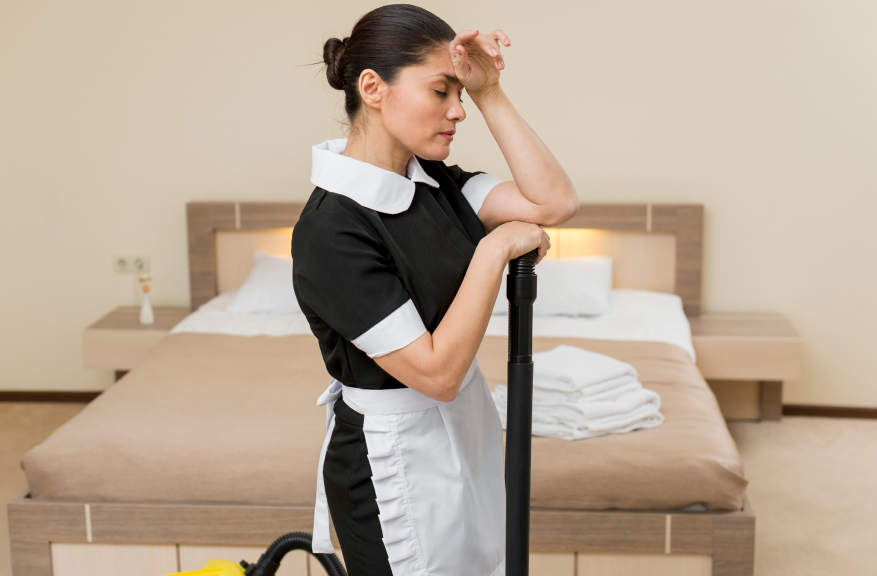Table of Contents
- Introduction
- Why Proper Licensing Matters in Dubai
- Legal Risks of Using Unlicensed Domestic Worker Agencies
- Hidden Financial & Safety Risks for Families
- How to Identify a Licensed Agency (Step-by-Step)
- Red Flags: How Illegal Operators Target Households
- Real-World Consequences: Recent UAE Crackdowns
- Safer Alternatives: How to Hire Domestic Help the Right Way
- Dubai-Specific Hiring Checklist (Visa, Medical, EID)
- Licensed vs Unlicensed: What You Really Pay (Comparison)
- FAQs: Protecting Yourself and Your Household
- Conclusion & Next Steps
Blog|10 Sep 2025
The Dangers of Hiring Domestic Help Through Unlicensed Agencies in Dubai

Introduction
Hiring a housemaid, nanny, or caregiver is a major decision that affects your household’s safety, finances, and peace of mind. While the right match can make life easier, working with the wrong agency—especially an unlicensed one—can expose you to legal trouble, financial loss, and ongoing stress. Unlicensed recruiters often skip essential screening, avoid standard contracts, and disappear when problems arise.
This guide explains the risks of using unlicensed domestic worker agencies in Dubai, how to verify licenses, the latest 2025 enforcement actions, and a clear, practical path to hire safely and legally under UAE regulations.
Why Proper Licensing Matters in Dubai
Domestic worker recruitment in the UAE is regulated by the Ministry of Human Resources and Emiratisation (MoHRE). Licensed offices must follow standards designed to protect both families and workers. This framework ensures you have enforceable paperwork, clarity on fees and services, and access to official dispute channels if something goes wrong.
In 2025, MoHRE reiterated the importance of using licensed channels after taking action against illegal operators and blocking social media accounts promoting unlicensed services. For Dubai households, the key takeaway is simple: when you work with a licensed office, you’re dealing with a regulated entity that can be held accountable.
What licensed offices provide:
- Written, MoHRE-approved contracts that are enforceable
- Identity, background, and medical fitness checks before placement
- Clear service packages, pricing, and refund/replacement terms
- Dispute resolution channels via MoHRE
Legal Risks of Using Unlicensed Domestic Worker Agencies
Hiring through unlicensed channels breaches UAE domestic worker regulations and can quickly spiral into legal complications. Without the protections that come with MoHRE-standard processes, families often find themselves with weak footing during disputes and vulnerable to penalties.
What can happen:
- Fines and legal exposure, with referrals to Public Prosecution in serious cases
- Weak or non-existent contracts that are hard to enforce for wages, duties, or refunds
- Visa and residency complications for the worker if recruitment was improper
- Employer liability that may drag families into proceedings—not just the agency
MoHRE’s 2025 updates make clear that this is not a gray area: illegal offices have been shut down, penalized, and blocked online. If there’s any doubt, verify with MoHRE before you proceed. Note: This article is general information, not legal advice. Always confirm requirements with MoHRE or a qualified professional.
Hidden Financial & Safety Risks for Families
Beyond legal issues, unlicensed agencies can create direct financial losses and safety concerns inside your home. Because these operators often avoid transparency and proper vetting, families face higher risks during placement and after the worker starts.
Common pitfalls:
- Upfront fee scams with vague terms; the agency disappears when problems arise
- No refunds or replacements, even when promised informally
- Poor screening: no reliable background checks, references, or medical fitness confirmation
- Mismatched duties and skills—especially for childcare, elder care, or special needs
- Insurance and liability gaps if the employment relationship isn’t set up correctly
How to Identify a Licensed Agency (Step-by-Step)
The fastest way to protect your household is to verify the agency before you engage. Use the checklist below as a simple, repeatable process.
1) Verify the license
Start at the official MoHRE website and locate the section for “Approved Domestic Worker Recruitment Offices.”
2) Check transparency
A legitimate office displays package names and prices clearly and provides written refund/replacement terms with timelines in the contract. Lack of clarity is a warning sign.
3) Review the paperwork
Ensure you receive a MoHRE-standard job offer/contract. The role, duties, salary, rest time, and accommodation must be explicitly stated. Keep copies of everything.
4) Inspect the office
Look for a visible MoHRE license, trade license details, and a proper customer area. Reluctance to show documentation or a purely virtual presence should raise suspicion.
5) Avoid risky sources
Do not rely on WhatsApp, Instagram, or classifieds unless you can verify that the entity is licensed and listed by MoHRE. If it can’t be verified, don’t proceed.
Tip: Keep a folder with license proofs, receipts, the contract, and any correspondence. Documentation is your leverage if a dispute arises.
Red Flags: How Illegal Operators Target Households

Unlicensed operators often rely on pressure, secrecy, and “too good to be true” offers to convince families to skip due diligence. If you notice these patterns, hit pause and verify with MoHRE.
Red flags to watch for:
- Unrealistic fees or guaranteed instant placements
- Cash-only payments or transfers to personal accounts
- Refusal to show a MoHRE license or contract template
- A social-media-only presence with no verifiable office
- Pressure tactics like “offer ends today” or “we can bypass paperwork”
Real-World Consequences: Recent UAE Crackdowns
2025 has seen active enforcement against unlicensed recruitment. Authorities have moved on multiple fronts—closing illegal offices, penalizing violations, and blocking online promotion of unlicensed services.
Examples of actions taken in 2025:
- 11 unlicensed domestic worker recruitment offices in Al Ain were shut down for operating without proper permits or using licenses issued outside the emirate; penalties were imposed and cases referred to Public Prosecution.
- 40 domestic worker recruitment offices across the UAE were penalized for 140+ violations, including failure to refund fees within legally specified timeframes and failure to display MoHRE-approved service package prices clearly.
- In coordination with the TDRA, 77 social media accounts promoting unlicensed domestic worker recruitment were blocked in the first half of 2025.
These actions send a clear message: only licensed offices are acceptable channels.
Sources:
- MoHRE official news (10 Sept 2025): shutdown of 11 unlicensed offices in Al Ain
- MoHRE + TDRA (23 Jul 2025): 77 social media accounts blocked for unlicensed recruitment
Safer Alternatives: How to Hire Domestic Help the Right Way
The compliant route is straightforward once you know the steps and documents to expect. By following MoHRE standards and keeping records, you get predictable fees, defined service terms, and official recourse if issues emerge.
Core principles:
- Use MoHRE-licensed recruitment offices only
- Insist on MoHRE-standard contracts and keep every receipt
- Confirm medical fitness, background checks, and prior experience
- Match duties with the worker’s skills (childcare, newborn care, elder care, special needs)
- Maintain clear, respectful communication on routines, rest time, and days off per contract
- Escalate unresolved issues to MoHRE through official channels
Dubai-Specific Hiring Checklist (Visa, Medical, EID)
Once you’ve selected a candidate through a licensed office, follow this sequence to complete on-boarding cleanly and legally.
1) Entry permit and medical fitness
Ensure the worker’s entry permit is processed correctly and the medical fitness test is completed at an approved clinic for residency medicals.
2) Emirates ID and biometrics
Schedule biometrics promptly after medical fitness. Keep all appointment confirmations and related documentation in your records.
3) Residency stamping
Finalize residency stamping through the appropriate Dubai channels (e.g., Amer centers or online services). Retain copies of all submissions and approvals.
4) Contract copies
File the signed MoHRE contract and any addendums in the provided languages (typically Arabic/English). These documents govern rights and obligations.
5) Orientation at home
Walk through household rules, emergency contacts, and a daily schedule in a language the worker understands. Clear expectations reduce misunderstandings.
6) Payroll and record-keeping
Pay on time and maintain proof of payment and leave records. Proper documentation supports compliance and protects both parties.
Note: Always use official channels for submissions and fees. If unsure, check with MoHRE or a recognized service center.
Licensed vs Unlicensed: What You Really Pay (Comparison)
While unlicensed operators may advertise lower upfront fees, the lack of enforceable contracts, screening, and refund policies often turns “cheap” into costly. Licensed offices provide transparency, accountability, and official support that reduce risk over the long term.
| Item | Licensed Office | Unlicensed Operator |
|---|---|---|
| Contract | MoHRE-standard, enforceable | Weak/no contract; hard to enforce |
| Screening/Medical | Verified by office | Often unverified |
| Fees | Displayed packages; official receipts | Opaque; personal transfers; higher risk of loss |
| Refund/Replacement | Written terms; timeline defined | Often absent or ignored |
| Legal Exposure | Low if compliant | High risk of fines/disputes |
| Support/Disputes | Agency + MoHRE channels | Minimal or none |
Bottom line: “Cheaper” unlicensed routes often cost more when issues arise.
FAQs: Protecting Yourself and Your Household
Can I hire directly without an agency?
Yes—only if you follow all MoHRE steps, use a standard contract, and sponsor the visa through official channels. Hiring via informal contacts or unlicensed brokers is a significant risk.
How do I confirm an office is licensed?
Use MoHRE’s website to find approved domestic worker recruitment offices and call 600 590000 to verify the agency’s details.
What if the worker leaves early?
Check your contract’s replacement/refund terms. Licensed offices should have clear policies. If they fail to honor them, contact MoHRE with your documentation.
Is “live-out” allowed?
It depends on your contract and accommodation terms. Discuss this upfront and keep the agreement in writing.
What are the minimum rest days and leave?
Refer to the Domestic Workers Law and your contract. The official portal (u.ae) outlines entitlements such as weekly rest, paid leave, and medical coverage requirements.
Conclusion & Next Steps
Hiring the right way in Dubai starts with one decision: use only MoHRE-licensed recruitment offices. This protects your household, secures the worker’s rights, and keeps your paperwork clean. Verify the license, insist on a MoHRE-standard contract, and retain copies of every document and payment. If something feels off, call MoHRE before you commit.
For tailored support, you can work with a trusted advisor who can verify an agency, review your contract, or handle the end-to-end process. Ready to hire safely and legally in Dubai? Contact Imdad HR for a quick agency check or full-service support. Share this guide with a friend who’s hiring, and subscribe to our updates on domestic worker rules and best practices.







